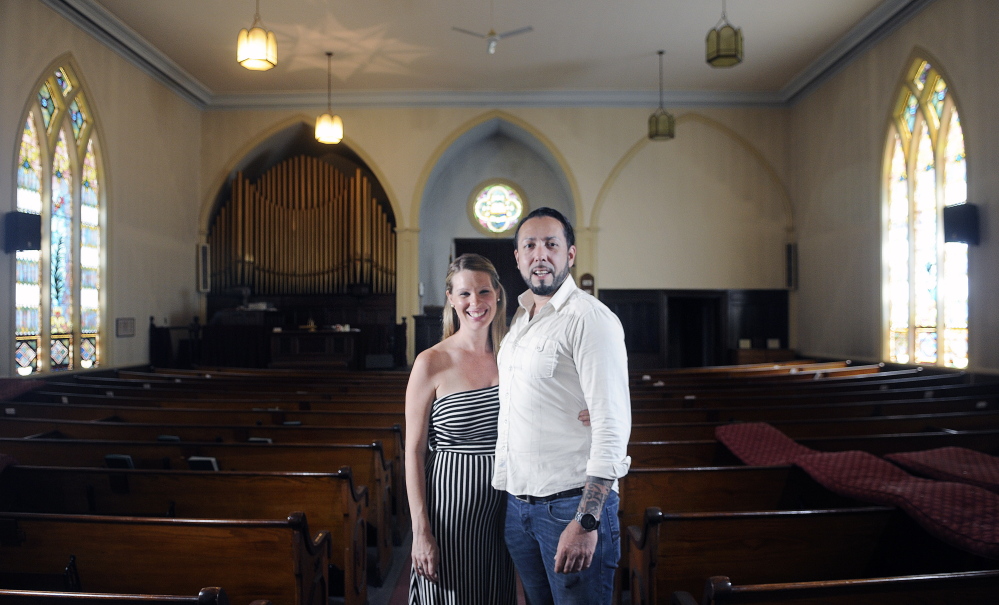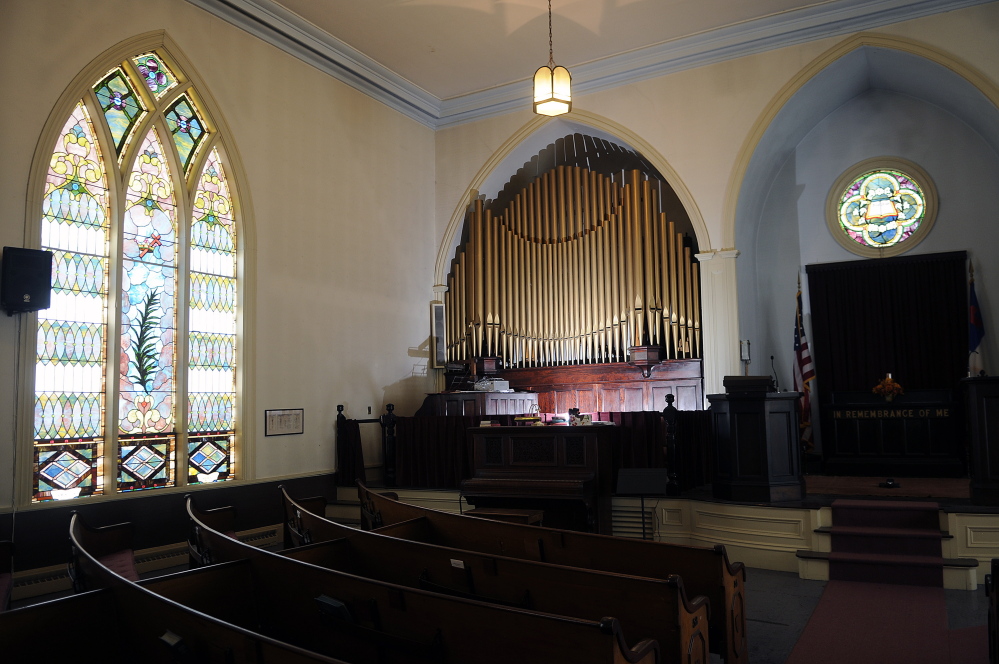GARDINER — Founders of a hard cider brewery hope to open later this year in a former church, becoming the first business to use new city zoning rules that allow for the re-purposing of older, nonresidential buildings in neighborhoods.
If all goes as planned, the hard cider brewery will finish its first batch by the middle of September and convert the former Gardiner Congregational Church’s expansive sanctuary into a tasting room by next May.
But first the Planning Board and City Council must approve the application to use the property on Church Street, which is in the high-density residential zone, as a hard cider brewery through the adaptive reuse process approved by councilors early last month.
The process allows for some commercial uses in older buildings originally built for nonresidential uses in the high-density residential zone. It limits the allowed uses to about a dozen options including banks, restaurants, retailers, light manufacturing, research facilities, funeral homes and artist studios.
David Boucher and his fiancée, Kristina Nugent, of New Harbor, have been looking to open their Lost Orchard Brewing Company in the former church for more than half a year, but the zoning rules didn’t allow it. Boucher, 39, is optimistic the Planning Board will approve the plan at its upcoming meeting.
The board is scheduled to hold the review and public hearing on the plan at its meeting at 6 p.m. Tuesday at City Hall.
Part of the reason for choosing the church as the location is because Boucher wanted to see it preserved, he said. They plan on locating the three, 1,000-gallon tanks in the smaller meeting room in the back of the church and reinforcing the floor to be able to hold the weight — one of the only major renovations needed, Boucher said.
Much of the rest of the church will remain largely untouched. The organ and its large pipes to the left of the altar, the future home of the cider, will stay. Boucher said they won’t be selling at the cidery until the tasting room is completed next May with a grand opening tentatively planned for Memorial Day.
After that, he plans on selling growlers of hard cider and some bottles on-site. Boucher said it will be distributed in stores across the states in six-packs, 12-packs and 22-ounce bottles, as well as on tap at bars and restaurants.
“We want to be one of the heavy hitters in the game. It will take a little while to get there, but so far we have a good head of steam behind us,” Boucher said from the church’s sanctuary on Sunday.
He said they plan on taking a craft-beer approach to hard cider, offering limited bottle runs with special recipes. Some will be aged in whiskey and gin barrels, and he has a recipe for a maple-bacon cider. Maine Apple Company in Monmouth will provide the cider, Boucher said.
While the state of Maine has seen its number of breweries grow to more than 50 in recent years, there are only a handful of hard cider producers in the state. One hard cider brewery, Downeast Cider House, which opened in Waterville at the start of 2012, is now based in Boston, Mass.
“There’s definitely a need for it in the market,” Boucher said.
He said he sees the hard cider industry as less saturated than craft beer, but he expects more growth in the future. “I think in these next three or four years, you’re really going to see a spike in the amount of hard cider throughout the U.S.,” Boucher said.
Hard cider made up less than 1 percent of the country’s beer sales, which includes cider and flavored malt beverages, in 2012,according to Nielsen, but production tripled between 2011 and 2013.
If the plan is approved by the city, the cidery may produce up to 20,000 gallons of the hard stuff this year and up to 50,000 next year, Boucher said.
The goal of the adaptive reuse overlay district process is to allow the city to ease zoning restrictions for older, nonconforming buildings when it’s beneficial to the overall community and doesn’t hurt the character of the neighborhoods.
It can only be used for buildings that are no longer economically viable or physically suitable for uses allowed in the districts in which they’re located.
Eligible buildings must be at least 30 years old and have been used primarily for nonresidential purposes in the years since 2000 that it was occupied. It also must have at least 3,500 square feet of livable space and not be in an area that would be disrupted by the vehicle traffic from the new use.
The congregational church, which was built in 1843, announced in 2009 it would be closing its doors and selling the building, according to Kennebec Journal archives. Boucher said he and Nugent, 32, have signed a purchase-and-sale agreement to purchase the property from the church for $100,000 if the city approves the plan.
The board at its Tuesday meeting is also scheduled to hold a public hearing for a site plan review of a proposal from Wellness Connection of Maine to move its medical marijuana dispensary from Hallowell to the former train station on Maine Avenue in Gardiner.
Paul Koenig — 621-5663
Twitter: @paul_koenig
Send questions/comments to the editors.




Comments are no longer available on this story